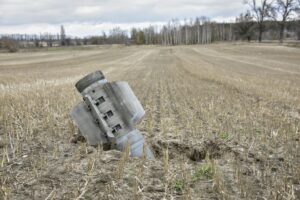
Deputy Foreign Minister of Ukraine Iryna Borovets received copies of credentials from the newly appointed Ambassador of the United Mexican States to Ukraine, Audencio Contreras Gonzalez.
According to the press service of the Ministry of Foreign Affairs of Ukraine, the parties discussed issues of strengthening and intensifying bilateral relations, primarily in the political and economic spheres.
Borovets expressed gratitude for Mexico’s participation in the Global Peace Summit, which confirms the country’s commitment to the principles of the UN Charter. She emphasized the importance of joint efforts to establish a just and sustainable peace in Ukraine.
“The diplomats also exchanged views on Ukraine’s cooperation with Latin American and Caribbean countries and opportunities for further development of bilateral relations,” the statement said.

The European People’s Party is considering electing a representative of the Socialist group to the presidency of the European Council for the first 2.5 years in exchange for their support of the EPP candidate for the next 2.5 years.
The final decision will not be made until next week, according to Politico. The EPP’s proposal was confirmed by Croatian Prime Minister Andrej Plenkovic. According to him, the European People’s Party seeks to retain one more position for the center-right political forces, in addition to the post of president of the European Commission, the Croatian edition of Jutarnji list quoted Plenkovic as saying.
According to Plenković, former Portuguese Prime Minister António Costa has the highest chances of becoming president of the European Council for the first 2.5 years.
He also noted that he is not interested in being elected to any positions in the EU’s governing bodies. “I am the Prime Minister of Croatia with a lot of experience, who wants to stay in office for a third term,” Andrej Plenkovic said, according to Jutarnji list.
The European Council is the highest political body of the European Union. The European Council consists of the heads of state and government of the EU member states, the President of the Council and the President of the European Commission. The term of office of the President of the European Council is 2.5 years.
Geographical structure of Ukraine’s foreign trade (imports) in Jan-Feb 2024, ths. USD

Source: Open4Business.com.ua and experts.news

The direct losses of the Ukrainian agricultural sector in the two years since the beginning of Russia’s large-scale invasion have exceeded $10 billion, so it is necessary to accelerate the pace of its recovery to ensure domestic and global food security, said Taras Vysotsky, Acting Minister of Agrarian Policy and Food of Ukraine, at the Forum for the Future of Agriculture.
He reminded that Ukraine is one of the world’s leading exporters of grains and oilseeds, and the restoration of the agricultural sector will ensure the stability of global food markets.
“Ukrainian farmers have suffered significant losses due to Russian aggression. From the destruction of agricultural machinery totaling $5.8 billion to the loss and destruction of livestock farms worth more than $250 million. And international food prices rose by about 35% in 2022. Only after new export routes were established did the situation stabilize. Therefore, support is needed to restore the Ukrainian agricultural sector,” the press service of the Ministry of Agrarian Policy quoted him as saying.
The acting minister emphasized the need for long-term projects to support the Ukrainian agricultural sector. One of them is the Ukraine Facility, a financial support program for Ukraine from the European Union.
Vysotskyi emphasized that increasing the production of value-added products is a contribution to the energy security of Ukraine and the European Union. According to him, Ukraine has the potential to produce enough bioethanol and biomethane from various types of agricultural waste.
He also pointed out the need to introduce preferential insurance for agricultural producers.

Insurance group “TAS” (Kiev) for January-May 2024 paid out UAH 785,23 mln under the concluded insurance contracts – it is by 54,3% more than the amount of indemnities of the company for five months of the last year, as reported on the website of the insurer.
More than a quarter of the total volume of payments fell on CASCO – UAH 218,72 mln, which is 38% higher than the corresponding indicator for 5 months of the last year. 2023, 34,37% or UAH 269,89 mln fell on MTPL (+39,2%), 19,5% or UAH 154,6 mln – on “Green Card” (+75,2%).
Even more – in 2,3 times – payments under contracts of voluntary medical insurance have increased up to UAH 117,94 mln, that makes 15,02% of the total volume of indemnities paid by the company in the reporting period
For the first five months of 2024, TAS IG paid UAH 4,13 mln under property insurance contracts, and UAH 19,94 mln under other insurance contracts – by 54,6% more than in the past.
SG “TAS” was registered in 1998. It is a universal company offering its clients more than 80 types of insurance products on various types of voluntary and compulsory insurance. It has an extensive regional network: 28 regional directorates and branches and 450 sales offices throughout Ukraine.

The Supervisory Board of PJSC Insurance Company “Columnaid Ukraine” on June 18 terminated the powers of CEO Svyatoslav Yaroshevych, appointing him Acting Chairman of the Board, according to the company’s information posted in the system of the National Commission on Securities and Stock Market.
The reason for this decision was the termination of the sole executive body “CEO” and the appointment of a collegial executive body “board of the company” in accordance with the new version of its charter.
It is emphasized that Yaroshevich is appointed acting pre-management until the National Bank approves his candidacy for the position of chairman of the board.
In addition, the NAB has appointed the head of underwriting department Oleksiy Pilipenko and financial director Yulia Aniskina as acting members of the Board, also before the approval of the NBU.
PJSC IC Colonnade Ukraine (until 2016 – PJSC with AI “QBE Ukraine”) was founded in 1998 as the first international insurer in the Ukrainian market.
As reported, the company Colonnade Finance SARL (Luxembourg) in November 2015 has concentrated 99,9833% of the authorized capital of the insurer. Earlier Fairfax Financial Holdings Limited entered into an agreement with QBE Management (Ireland) Limited and its Ukrainian partner on indirect acquisition of 100% of the Ukrainian IC through the companies Colonnade Finance SARL (Luxembourg), Fairfax Holdings Inc. (Connecticut, USA), Fairfax Financial (US) LLS (Delaware, USA).